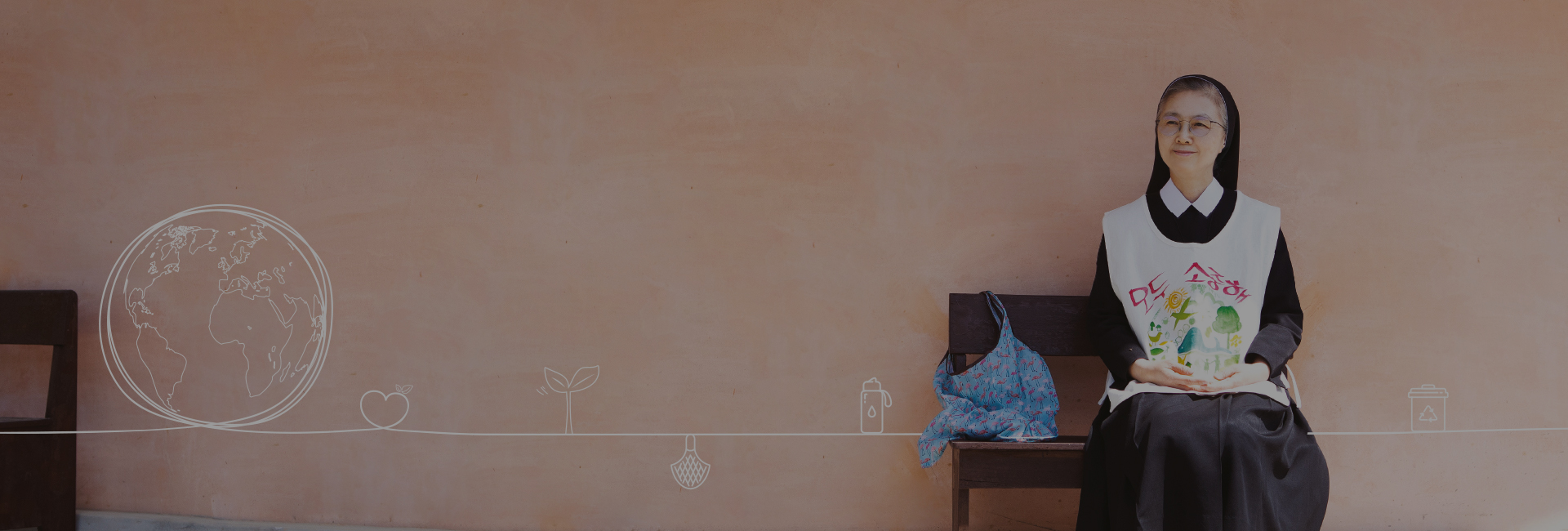
- Water, Nature and Humankind
- Natural Meeting
-
‘All together!’ ‘Create more value!’
Mun Jeom-suk, a Catholic nun and environmental activist- Written by.Choi Hang-jwa
- Photographed by.Kim Beom-ki
- Mun Jeom-suk takes the utmost care with every step and every breath she takes. Whatever she does, she wants to have as little impact as possible on the environment for the sake of future generations. As an environmental activist and Catholic nun, she uses fermented soap instead of chemical detergent, and sunlight instead of electric light, and practices recycling in such a way that 100% of the resources she uses are recycled. She also has a keen interest in creating a sustainable future.
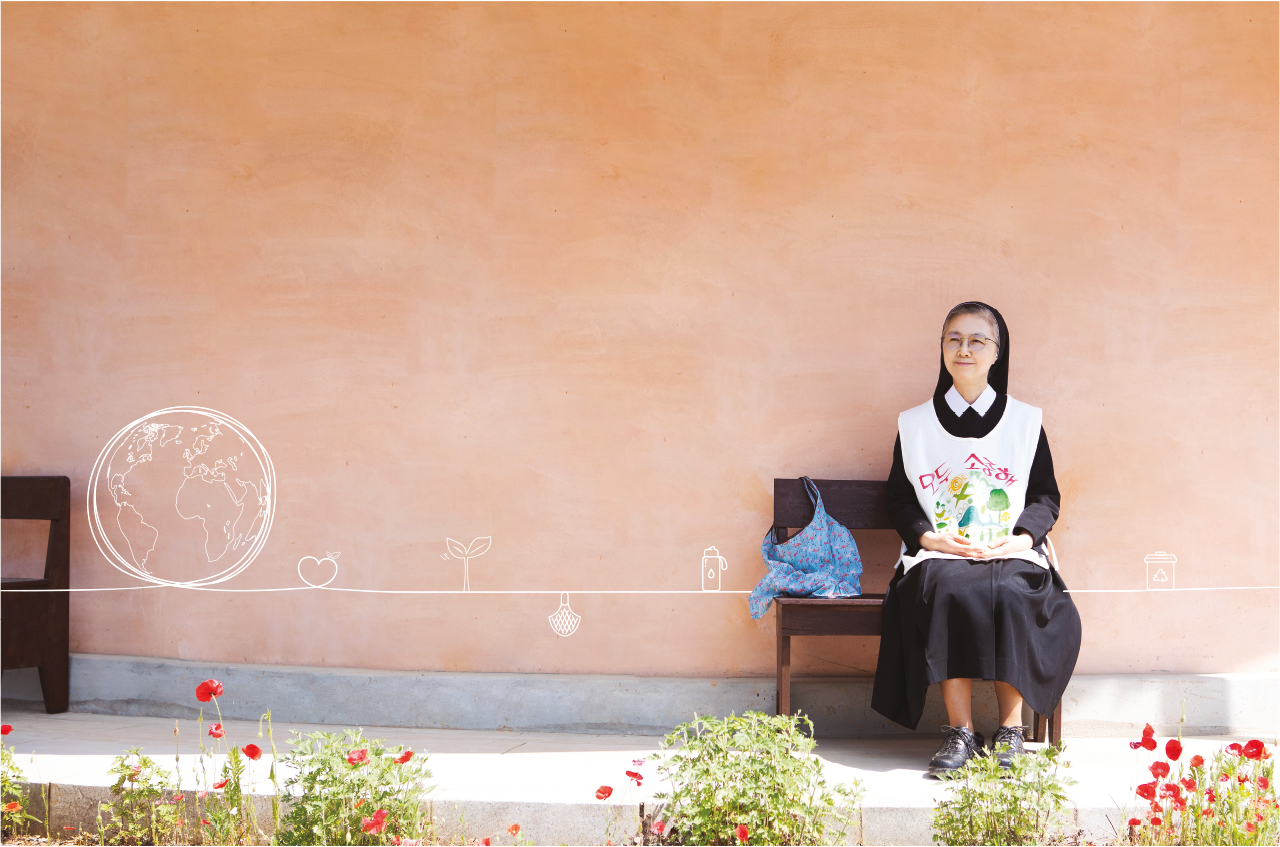
Education on ecological preservation to restore healthy nature
The sunshine is lovely. The sunshine at this time of the year is always warm and nice, but it feels particularly gentle and cozy at the Home of Ecological Spirituality of Notre Dame. Perhaps, the place is set in a pollution-free natural environment. “This place is the embodiment of our hopes for the restoration of the natural order of creation. It was established as a place where people can share and promote awareness of the need to restore nature by educating them on ecological spirituality, as we remain committed to organic farming to save the Earth,” said Mun Jeom-suk, a sister from the parish of Queen of Peace of Sisters of Notre Dame and an environmental activist who has actively fought against the environmental destruction that is undermining the sustainability of the Earth’s resources.
The Home of Ecological Spirituality of Notre Dame was built in Bureun-myeon in Ganghwado Island in 2008. The following year, the first community of Achimgari, an ecological farm, was formed and its members began to grow vegetable gardens around the Home. They tilled the soil and learned in the first few years, during which they planned and designed the ecological spirituality program. Catholic nuns moved in to Achimgari Farm in 2011, and children of Notre Dame Kindergarten of Incheon visited the farm on a field trip, thus becoming the first group of visitors to the farm, in the fall of the same year. “We design and offer a variety of ecological spirituality programs, educate people on climate change and environmental crises in general, and share ideas and ways on how to live an ecological life in order to respond to these crises.”
The ecological preservation programs she teaches are designed to share and promote the energy-saving lifestyle, eco-friendly eating habits, and potential ways of recycling resources as well as living an ecological lifestyle. The programs also include visits to environmental facilities and. As the old sayings go, a picture is worth a thousand words, and seeing is believing! These phrases are especially true in the field of environmental education. First-hand experiences can teach the most powerful lessons when it comes to environmental protection.
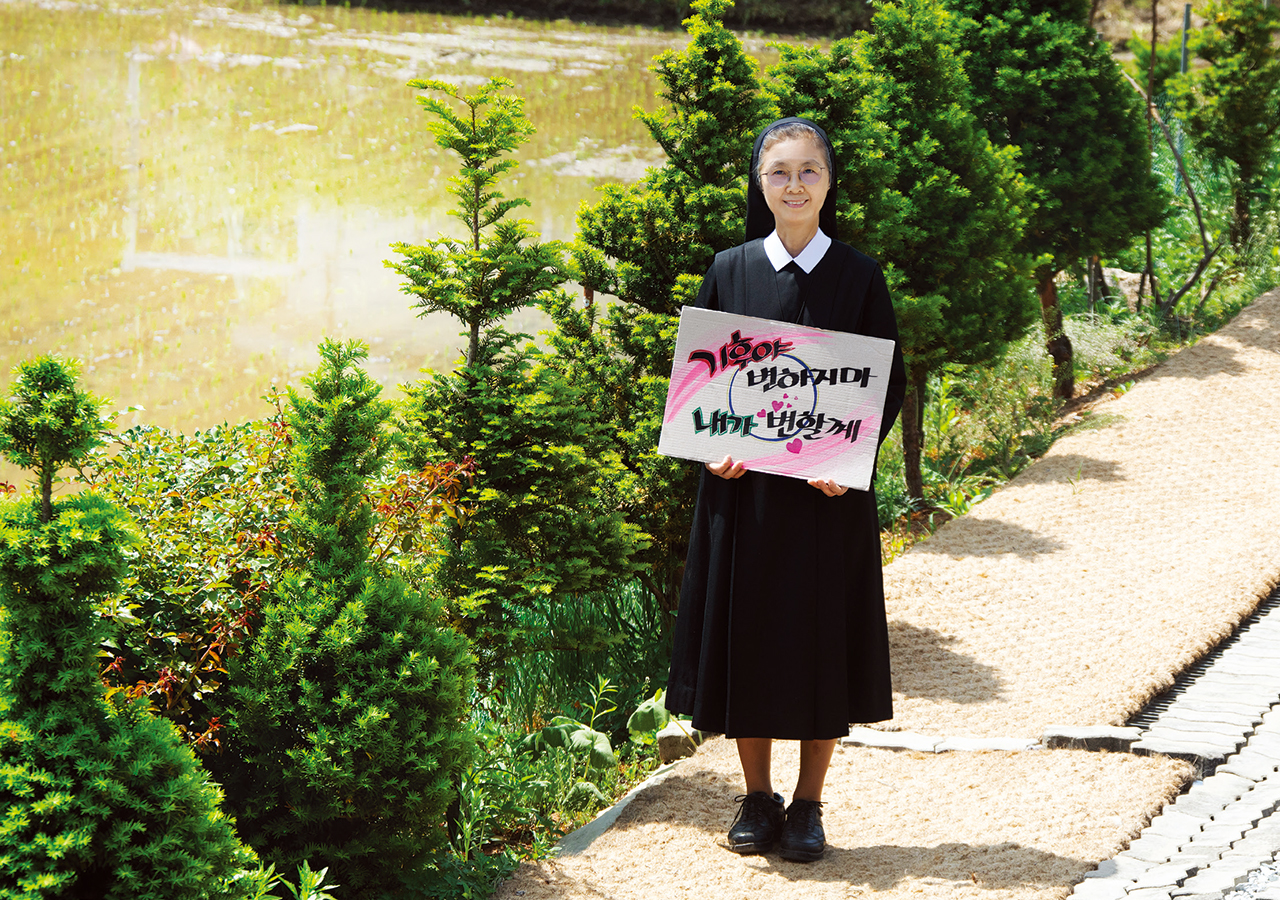
From plastic bag-free bazaars to plastic gleaning
The Green Peace movement that started in the early 1990s in Daegu triggered She interest in the ecological environment. Initially, she put her knowledge of environmental protection into practice by not using shampoos, a major water pollutant, and doing whatever she could do in her everyday life. In 2012, she took part in an environmental education program provided by the Home of Ecological Spirituality of Notre dame and realized that implementing environmental protection requires strong commitment and devotion. “It was an eye-opening experience. It made me realize that our quick and easy everyday habits and lifestyle were destroying the Earth.” Later, her academic interest expanded to different areas of environment and, in 2016, she published a thesis for a master’s degree in Culture of Life at the Graduate School for Life of the Catholic University of Korea. The thesis focused on promoting the culture of life, based on the encyclical letter of Pope Francis, “Praise Be to You”. Since being appointed to the Department of Environmental Affairs in the Incheon parish in 2018, She has performed her job as an environmental activist working on specific environmental projects and campaigns for the parish’s 540,000 Catholics.
She has also held plastic bag-free bazaars and run the Use Less Plastic Bag Campaign for traditional markets. Inspired by the Plastic Mill Project of the Korea Federation of Environmental Movements, She is also conducting the Plastic Gleaning Campaign to collect recyclable waste.
“I think ‘efforts to restore the natural environment’ is not merely a campaign but more a permanent part of life. As a child of God, the creator of the world, I am obligated to take good care of the Earth, which is a home for all living creatures. When I do something for the environment or offer environmental education to members of the community, it is such a joyful and rewarding experience to see more people join the cause.”
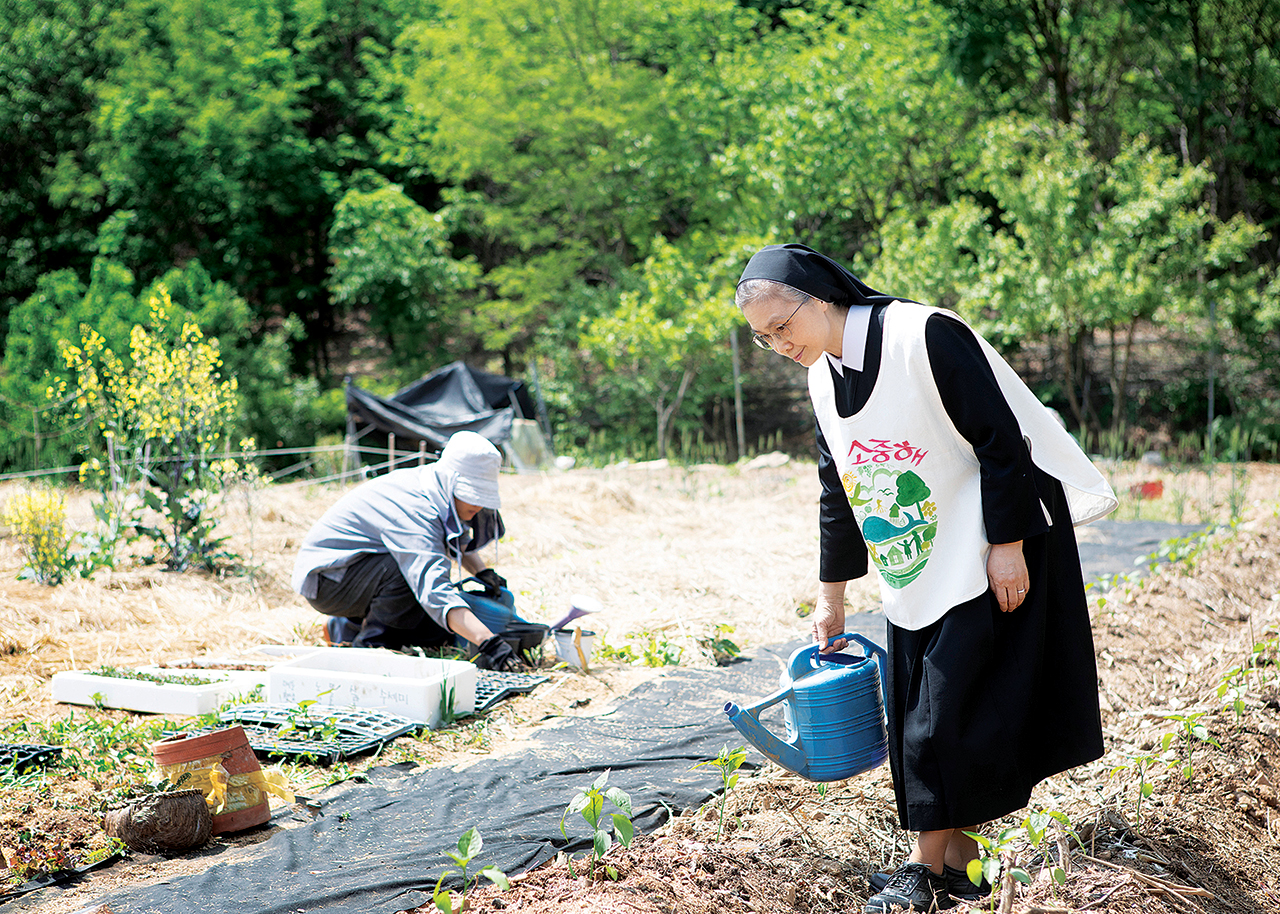
When small efforts to create a sustainable future add up…
She has made good memories while working as an environmental activist. She was appointed the first honorary citizen of the Special Environment City and was involved in a birdwatching program. As part of the program, a tracker was attached to each of the spoonbills living on Gaksibawi Rock, which were released later. She and the other volunteers ran a resources recycling store. It was an eye-opening experience to observe the activities of microorganisms at a water recycling center. She also joined the campaign to preserve a village in Jeju Island that produces gangjeung, traditional Korea sweet rice puffs. All these and many more memories have become precious assets for her. “I want to use these assets to create a sustainable future.” She believes the key issues for Incheon are shifting to eco-friendly energy and educating people on how to preserve the tidal flats in Ganghwado Island, in addition to recycling resources. While most people’s bucket lists are concerned with acquiring possessions and having novel experiences, her checklist is full of issues related to saving the Earth.
“Since the local landfill will stop operating in 2025, we need to make urgent efforts to practice minimalism and minimize waste. We also need to work on reducing the volume of chemical pollutants generated at industrial complexes. I hope more bike paths will be made so as to realize the grand vision of carbon neutrality at the earliest date possible.” She is afraid to watch the world news these days, mentioning the impending doom and gloom of global warming. Nowadays, we are all in the grips fear at the thought that the earth will no longer be inhabitable if we carry on like this.
“Koreans use the same amount of water each day that Africans use in a month. We must spare no efforts in conserving water. I would like to urge more people to join us for water conservation.”
As soon as the interview was over, She headed to a garden. The new mini photovoltaic panels that had been installed recently were shining across the garden. Protecting the environment means perhaps willingly accepting inconveniences for the sake of the community. As they say, less is more. Clearly, her actions speak louder than words. She sets a good example by practicing her beliefs for what we need to do for a sustainable future.
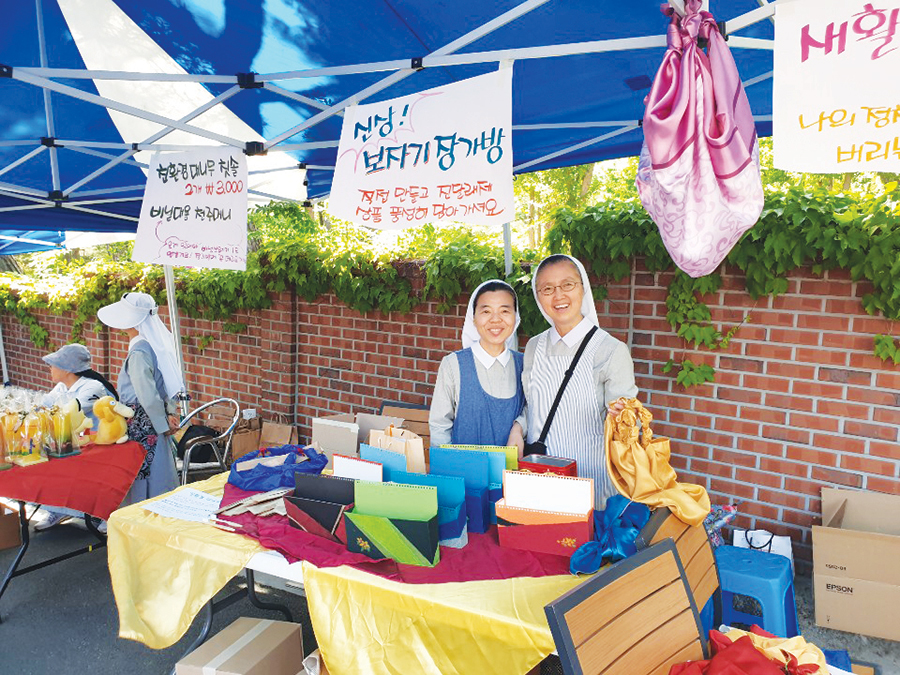 ※ This interview was conducted in accordance with the COVID-19 safety rules.
※ This interview was conducted in accordance with the COVID-19 safety rules.

Three little things Sister Mun Jeom-suk practices to save the Earth
1. Do without it! _ There are some things we can live without. If we use less of such things, we all will be better off eventually. They include disposable straws, plastic containers, forks and spoons.
2. Use fermented soap instead of shampoo! _ Shampoos and body cleansers can make your hair and body clean with rich bubbles. But EM fermentation soaps can keep the environment clean. You can use them from head to toe.
3. Mini photovoltaic panels _ Stop using florescent lights today and start using mini photovoltaic panels. Put them on the veranda or in a sunny place during the daytime. You can save enough energy to have lights as bright as electric lights.

